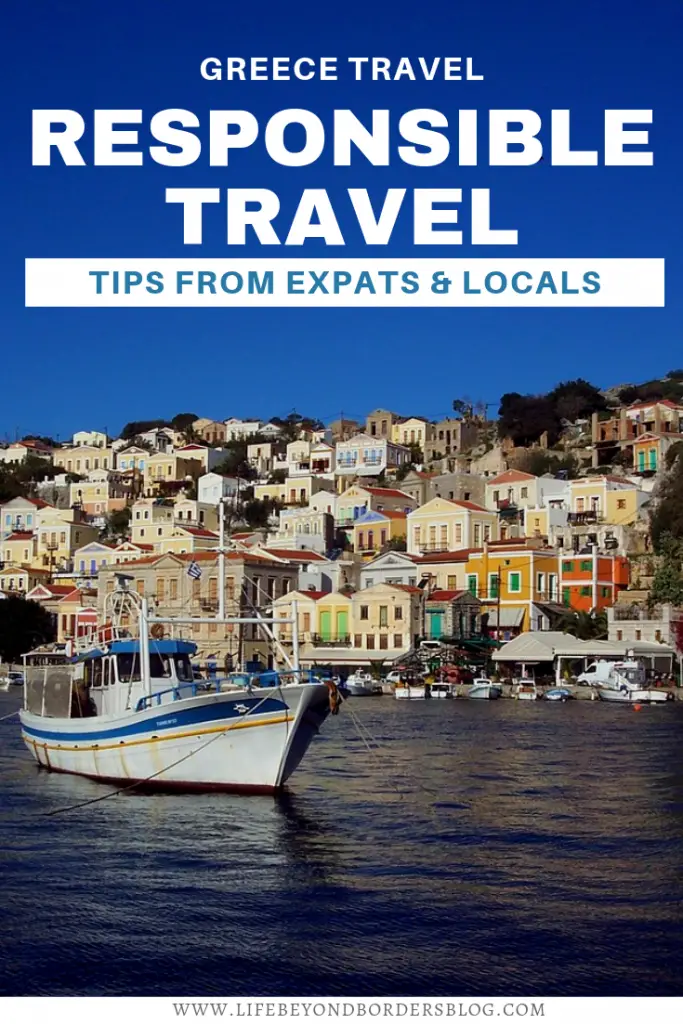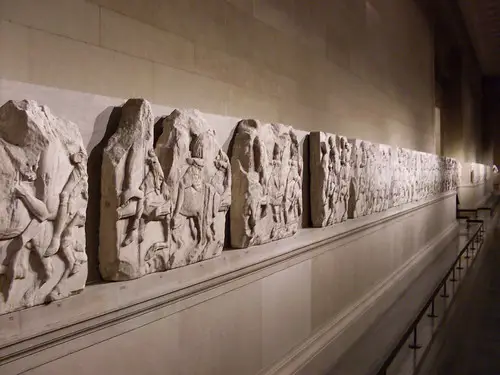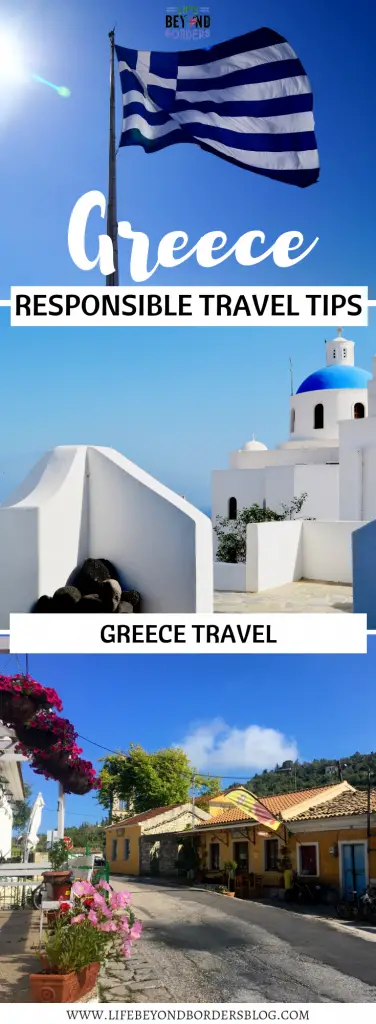One of my most popular posts on this site is my Do’s and Don’ts in Greece – Greek Customs and Etiquette by an Athens Resident where I offer you some advice as to what to expect when you visit Greece, either long term or on vacation.
It prompted me to then write my Things to Know Before Travelling to Greece post and expand it further, looking at best time of year to come, public transport tips and recommended pre-reading (including my novel! See below)
Due to the popularity of these posts, I’ve decided to take a look at what local people and/or long term residents would recommend – how to travel responsibly in Greece. This is designed to help you when you visit this beautiful country, to travel responsibly in general and respect your host culture. It could, really, be applied to where ever you travel.
Looking for a travel guide to Greece that fits into the palm of your hand? Then my Greece’s Best Travel App for Android, iPad and iPhone is just for you.

You’ll find some pet peeves from people to some responsible travel advice local to Greece which you may not have known about prior to coming. I hope it’s helpful.
Travelling responsibly in Greece – some tips:
-
Do not, under any circumstances, think it is ok to have your wedding abroad and pose for lewd pictures of yourself with your groom outside the sacred church.
This is a true story. I know the British can make a bad name for themselves a lot of the time when we travel (and I am British so I can say this – sorry, but we do).
Back in 2017, a British couple wed at St. Paul’s Bay in the Greek island of Rhodes and felt they wanted to ‘pose for a cheeky photo to reflect their sense of humour’. Unfortunately that ‘cheeky photo’ meant them posing on the beach with the church as the backdrop, with the bride undertaking a ‘lewd act’ on the groom.

All foreign weddings have since been banned, with the local Archbishop stating:
We are Greek and we cherish our traditions and the sanctity of our religious sites. We cannot allow this disgusting behaviour to prevail.
I am unsure if the ban has been lifted. You can read more from this Daily Mail article. Many future husband and wives to be were considering suing the couple for ruining their future wedding plans as they’d already paid to be wed there.
Lesson? I think this is an obvious one. If you want to get married abroad, just respect the local culture. And think to yourself; would you do this in your home country?
2. Don’t take advantage of the Greek friendliness/philoxenia
Greeks are known for being incredibly hospitable and kind – there’s even a word for it: philoxenia. It literally translates as a ‘love of strangers’ and is shown in numerous ways ranging from the way Greeks often offer you free dessert at the end of your meal to the time when my elderly father came to visit, became lost in my neighbourhood and ended up having a whole kafenion (men’s cafe) come to his rescue to help him find my apartment building.
But just because it is bestowed upon you does not mean it should be expected. There is the risk that visitors get used to it – through no fault of their own – just naturally assume their dessert will be free, for example. Enjoy it and be grateful when you receive it, because whilst it’s famous in Greece, it’s not bestowed on just anyone…it is selective.

Travelling responsibly in Greece: some tips
3. Do not make the mistake of assuming the Elgin Marbles belong in the British Museum
And whilst we’re at it, don’t actually call them that – they are really the Parthenon Marbles. For those unfamiliar with the history, the Parthanon Marbles are a collection of classical marble statues made and designed to be part of the freeze that adorns the Temple of the Parthenon and other parts of the Acropolis in Athens.

Between 1801 – 1812 agents of British Lord Elgin 7th removed about half of them and shipped them to Britain, claiming he had a an official decree for this – but this has always been in dispute.
Now housed in the British Museum, there has been an ongoing dispute and various actions and movements to bring the Marbles back to their (rightful) place. In 2014, UNESCO offered to mediate between Greece and the United Kingdom to resolve the dispute, although this was later turned down by the British Museum on the basis that UNESCO works with government bodies, not trustees of museums. Read more on Wikipedia. Matt Damon and George Clooney, along with human right lawyers such as Amal Clooney are just some of the high profile figures that have campaigned for their return, to be placed in the Acropolis Museum. But the British Museum remain resolute; they will only loan the Marbles back to Greece for a period of time (perhaps fearing if a bid to return these are successful, maybe half of the British Museum’s possessions will have to be returned!)

What are your thoughts? Where should they go? Just remember, it’s a contentious subject in Greece – one they feel very passionate about.
4. Remember the importance of Greek traditions when visiting villages
The local that contributed this advised she is fed up with seeing tourists stick their cameras and phones almost in the faces of elderly Greek ladies dressed in black as they wander around the villages.
Remember, it is tradition in Greece (not so much these days, but for the elderly), for widows to dress in black and they feel it is a reminder of their husbands.
Just ask if you’d like a photo. And it doesn’t matter if they don’t understand – universal gestures such as pointing at your camera and shrugging always gets the message across. See my image below as an example – this lady on the Greek island of Kastillorizo was more than happy when I asked her grandson. She was a lovely old soul and gave me some honey as a gift.

Also, this lady clambered into the back of my rental car on the Greek island of Karpathos when she literally stood in the middle of the road. She lived in a high mountain village and her only way of getting anywhere was to walk, then demand a car stop! She didn’t even ask me – she just clambered into my car and indicated I should ‘drive’ by pointing straight ahead.
She was more than happy to have a picture taken. It was a rather cute encounter!
Travelling Responsibly in Greece – some more tips
5. Don’t think that Greece is one big bazaar and it’s ok to haggle on every single price
Many locals have complained to me that visitors seem to think it is ok to haggle with, for example, a restaurant/taverna bill at the end of a night – or to haggle with buying an item of clothing in a clothes store.
Travelling responsibly in Greece means recognising Greece is a country where haggling does not take place in everyday businesses. It can be possible to do so when going to the local laiki – Farmers Market – but then again, prices are so cheap here, why would you want to haggle?

6. Travelling responsibly in Greece means respecting the signs
I have heard from residents on the holiday island of Zakynthos that several times, when travelling to the Blue caves and Shipwreck Beach (for which Zakynthos is famous for), visitors routinely ignore the ‘Do not Climb the cliff face’ signage. Often keen to get the best Instagram shot, people can be seen climbing up even a bit of the rock face.
I hate to point out the obvious, but signs are there for a reason are they not? And don’t forget, earthquakes – which can be a common occurrence in this part of the world – can make geology a little unstable.
If it’s safe to go on the beach – fine! But don’t walk where you shouldn’t.
Zakynthos Informer is a great resource to help you when planning your holiday to this island.

7. Going where you shouldn’t for that perfect Instagram shot
An example of not travelling responsibly in Greece is when a long term resident of Santorini pointed out she is not happy when she sees people trampling over the blue domes of churches to pose for that perfect Insta shot.
I am trying to be a little ‘gentler’: people may not realise where they are standing. Santorini is an island that is staged you see, raising in stages from the sea up the caldera to the top. It is possibly easy to stand on the roof of a building without realising it. However, paths are very clearly marked out and one would have to deliberately step off a path to have a photo taken.
Please be mindful that anything with a blue domed roof – and white cross – is actually a church and it is not OK to stand on to get that perfect shot. Would you do this at home?

Photo by Russell_Yan (Pixabay)
I hope these tips have been useful. Mostly, how to travel responsibly in Greece – or any country – means exercising common sense really, mostly a lot of visitors possess this. But there’s never any hard in arming yourself with some more knowledge of local do’s and don’ts and practices.
What do you wish people would/wouldn’t do when they come to your country? Share in the comments below.
PIN for later




Isn’t it a shame that someone such as yourself has to write a list of ways to behave abroad. The people that disrespect foreign countries probably disrespect their own. Something is very wrong somewhere
Hi Tim,
Through my research with locals and people living in Greece, this is what I came across. I think in this technology day and age, people especially need reminding that there is a ‘way to travel’ and what one would think of as common sense isn’t always – clearly. What particularly surprised me was the people stepping over sacred ground ie: roofs of churches to get that ‘perfect Instagram shot’. But then again, maybe I shouldn’t be surprised – which is a shame.